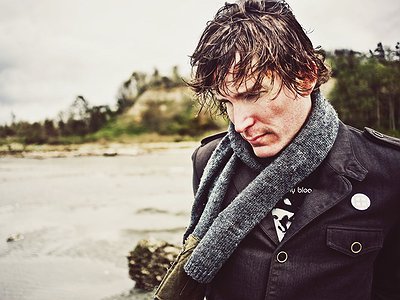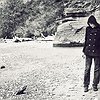The relationship between music and other forms of art – painting, video art and cinema most importantly - has become increasingly important. How do you see this relationship yourself and in how far, do you feel, does music relate to other senses than hearing alone?
I would like to think my music is very visual and while the image perhaps may not be the clearest at points, there are all these elements that come to the forefront in a mix and that carry the weight of the composition in an almost lyrical way even when the music is instrumental.
There seem to be two fundamental tendencies in music today: On the one hand, a move towards complete virtualisation, where tracks and albums are merely released as digital files. And, on the other, an even closer union between music, artwork, packaging and physical presentation. Where do you stand between these poles?
I have released almost 95% of my work on a physical vinyl format, in limited runs of course. I like to hold an item in my hand, there is simply no substitute for it. Of course, digital has some conveniences that are good, so I do not want to disregard those completely. I think balancing the two is the key to sustainability. I'm grateful to anyone who's bought one of my records at a shop, online or at a gig.
The role of an artist is always subject to change. What's your view on the (e.g. political/social/creative) tasks of artists today and how do you try to meet these goals in your work?
I think creativity is how you develop problem-solving skills and come up with solutions to advance any cause. It is a pity that here in the US, the trend in the education system has been to eliminate all these programs that foster creativity.
I'm terrified of the kind of leaders we are raising – completely useless tools, conforming to the norm with no individuality or critical thinking abilities. Our goal as artists should be to push boundaries and challenge at some level conformity and common, widely, accepted views – regardless of the subject.
Music-sharing sites and -blogs as well as a flood of releases in general are presenting both listeners and artists with challenging questions. What's your view on the value of music today? In what way does the abundance of music change our perception of it?
As I was telling a writer during an interview, music is completely devalued today. Not just in the financial sense, but also in the way we relate to it and create fond memories to a certain soundtrack. For example, when I was a teenager growing up poor, I only had enough money to own 4 or 5 records. I heard those many, many times, and it was during those repeated listens that I truly appreciated their beauty. At the same time, I created memories with those records and had different experiences in which those recordings where the soundtrack.
These days we have instant access to anything in the world but we truly miss out on what's the closest to us. We are unable to connect with others through music and this over abundance has made music completely disposable – jumping form one flavour of the month to the next on the iPod shuffle. Our collective attention span has shrunken significantly during the past 15 years. It's a pity and there seems to be no solution for this. We can barely keep up with releases these days.
The internet revolution was a blessing and a curse at the same time. But most importantly, we as users of these technologies have dug our own graves – just because something is possible, it doesn't mean we should do it.
How, would you say, could non-mainstream forms of music reach wider audiences?
Honestly, I don't think it's meant to do so – having a niche audience is what precisely makes it special.
Usually, it is considered that it is the job of the artist to win over an audience. But listening is also an active, rather than just a passive process. How do you see the role of the listener in the musical communication process?
One of the things I love the most about performing live is having the feedback from the audience, getting their reaction in real-time and responding to it. It really makes for some wonderful performances. When I started my own Substrata festival, the idea behind it was to break that barrier between listener and performer, so that the lines between the two are blurry. Artists then can learn as much from the audience as the audience learns from them.
Reaching audiences usually involves reaching out to the press and possibly working with a PR company. What's your perspective on the promo system? In which way do music journalism and PR companies change the way music is perceived by the public?
With all due respect, I think most journalists are lazy arses. Research and fact-checking seems to be a concept not taught anymore at journalism schools across the globe. The worst part is having these 'connoisseurs' dictating what is cool and what is not, and seeing all the other so-called journalists jumping on the bandwagon in the quest for page hits and advertising dollars.
It's a really sad state of affairs, particularly when really good publications go under cause they are unable to keep up with the press mill and demand for content from an ever increasing ADD audience.
Please recommend two artists to our readers which you feel deserve their attention.
I'd say listen to my sources of inspiration, friends and collaborators. That's a lot more than two and they are all wonderful!
Read and hear more Rafael Anton Irisarri at irisarri.org



